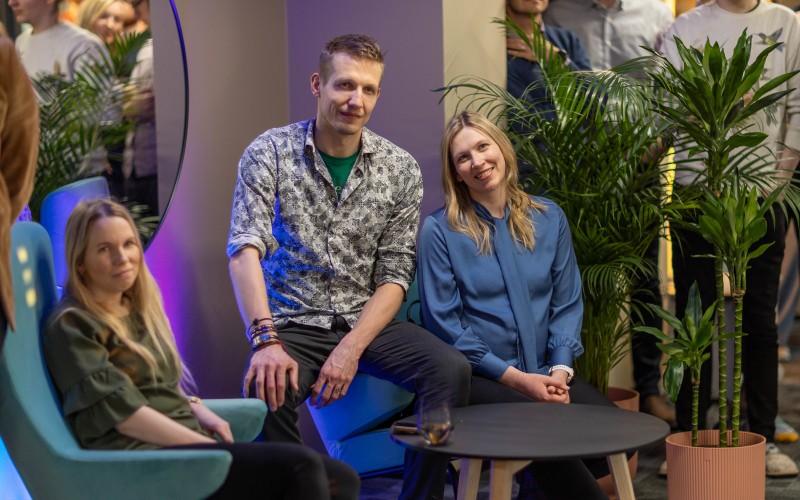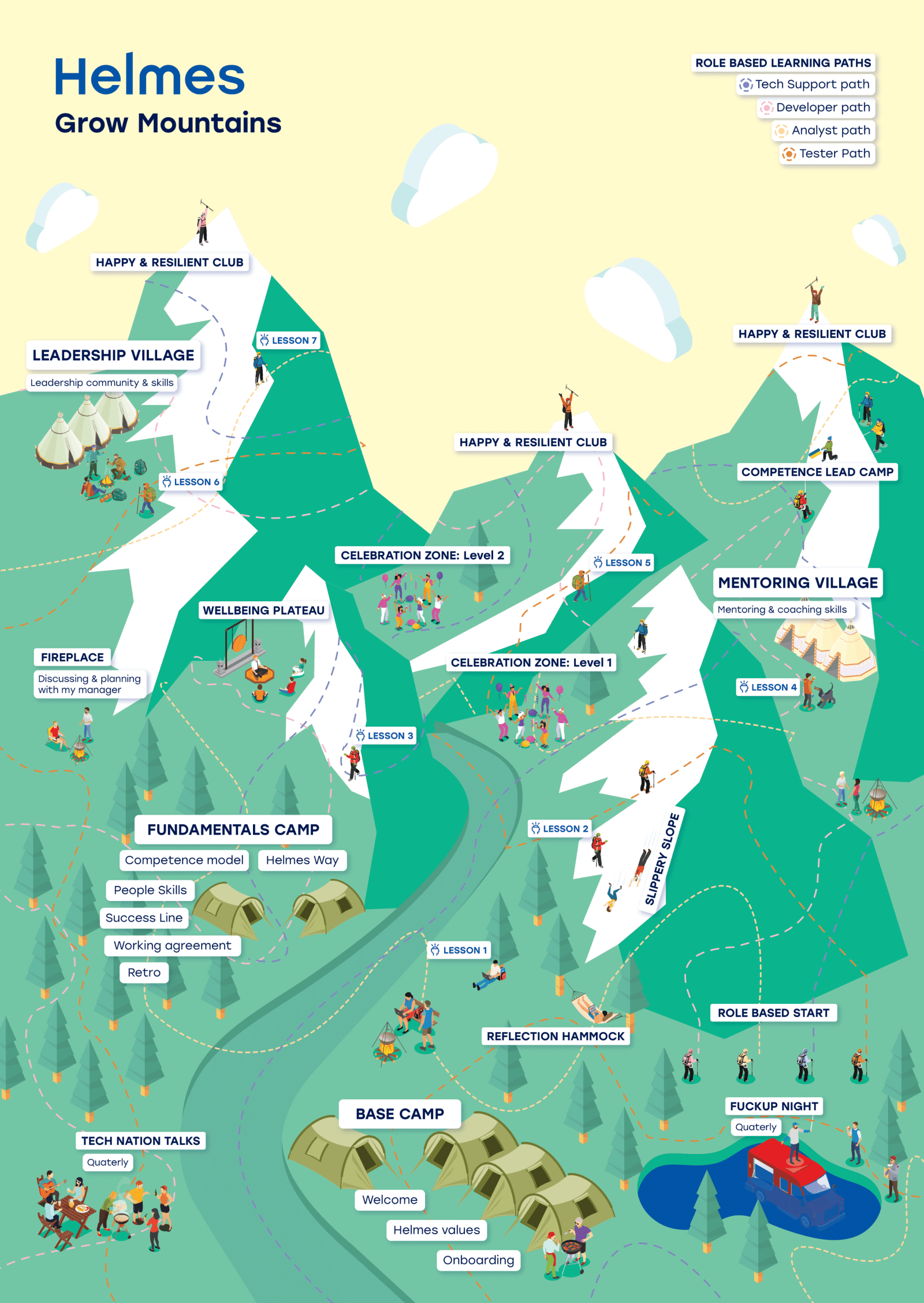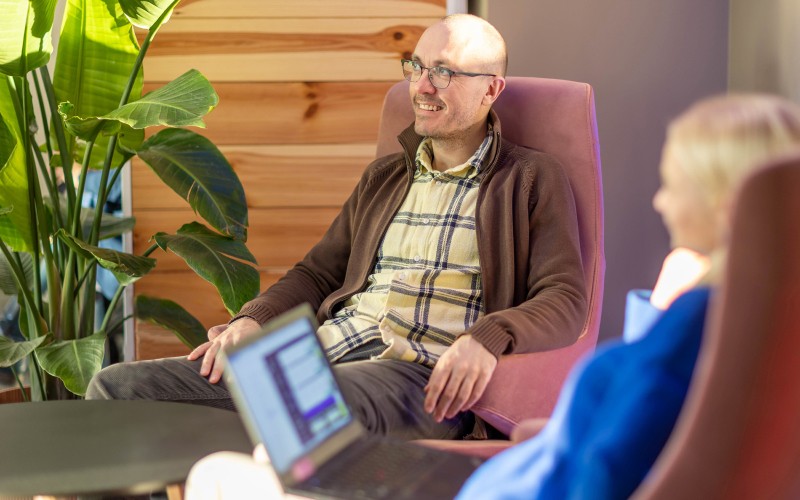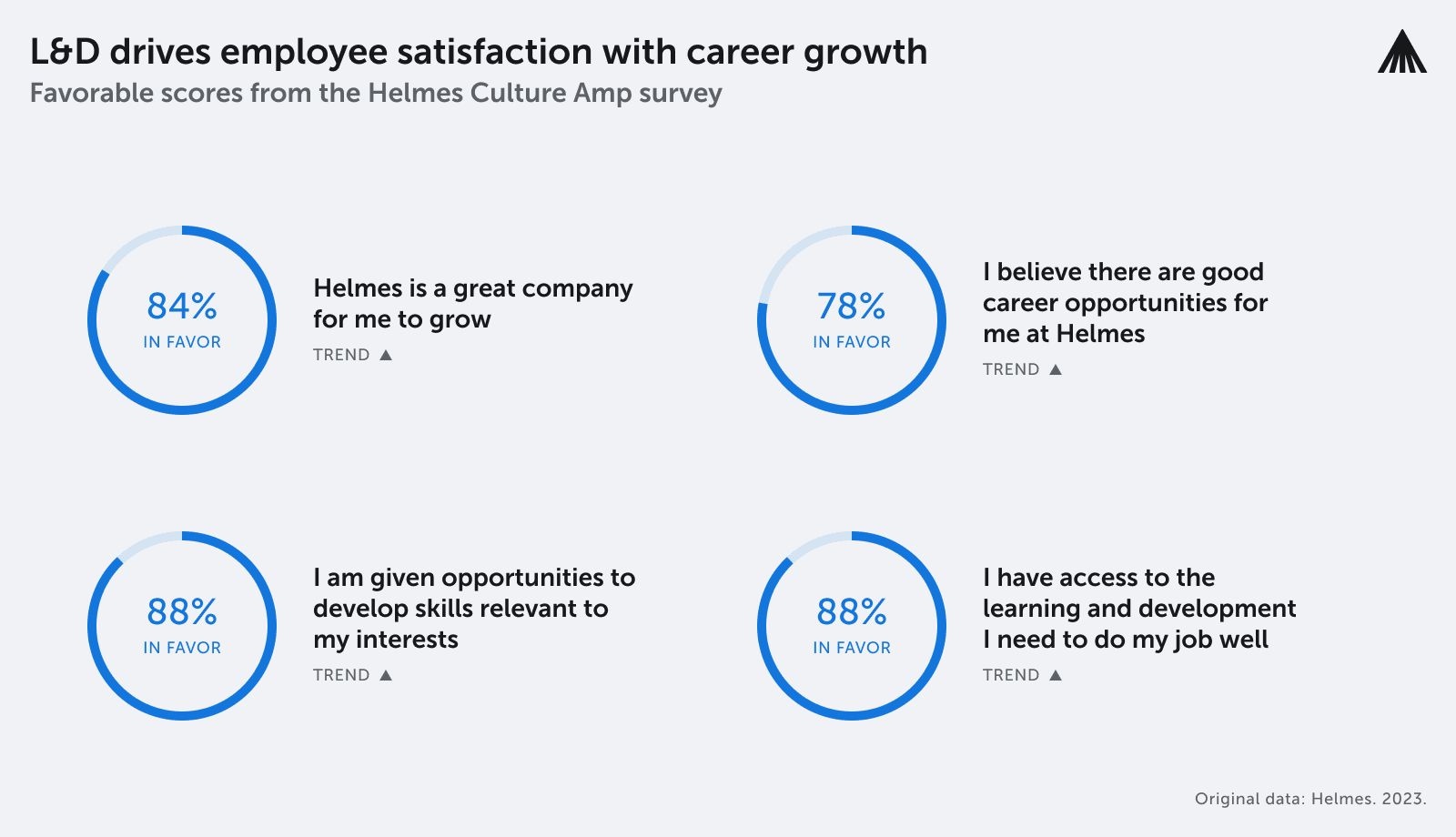Supporting individual growth and technology talent retention
Creating a holistic learning ecosystem at Helmes.

Key challenges
1
Scaling the learning system: Helmes needed a scalable solution to support its growing global presence and diverse learning needs.
2
Maintaining autonomy: The company aimed to preserve its culture of autonomy while integrating a unified learning platform.
3
Personalized development: Helmes sought to offer tailored learning experiences that align with individual roles, interests, and career goals.
A people business, not a software business
Helmes is a custom software developer of core business systems. It supports more than 500 medium- and large-size global enterprises such as telecom operators, banks, insurers, retailers, mobility companies, healthcare providers, and government institutions. With long-term partnerships that span decades, Helmes’ clients include Airbus, the Organisation for Economic Cooperation and Development, Kuehne & Nagel, ServiceChannel, and Solera.
Headquartered in Estonia, Helmes has roughly 1,500 employees in 14 locations including offices in Latvia, Lithuania, Poland, Georgia, India, and the United States. As suits an organization founded shortly after Estonia’s independence was recognized in 1991, Helmes maintains a strong culture of autonomy, which is reflected in a flat corporate structure. Business lines autonomously manage their own software teams, customer relationships, and profit and loss, and are supported by lean central administrative units. Helmes’ leaders believe that the knowledge and expertise of their people differentiate the services the company delivers.

Building a learning ecosystem to support autonomy and flexibility
Helmes’ culture of autonomy is represented in the company’s learning and development (L&D) philosophy, which establishes a “common language” around the company’s values and ways of working. Leaders refer to this as the “Helmes’ way” (i.e., an approach centered around applied science, which essentially creates repeatable positive experiences). This philosophy is foundational to the experiences Helmes strives to create for its customers and employees. When applying the Helmes’ way to employee experience, teams, and business units autonomously determine functional skill development needs and discretely offer what is most relevant to their teams and what most effectively serves customers.
Scaling the Helmes’ way became challenging as the company rapidly grew. The talent team had been using an in-house learning system, which served them well for many years.
However, as the company continued to expand to new markets in Europe and elsewhere, it needed to bring in a best- of-breed learning system that could scale to support its vision of a learning ecosystem. Leaders stewarded this vision, which included developing blended learning models and different digital learning formats.
Leaders also reaffirmed the importance of peoples’ expertise in growing their business. Employees could access tailored development opportunities that are selectively offered based on their roles, personal interests, or career aspirations. Also included were relevant onboarding and introductory training courses.
“We cannot leave it at offering a menu of courses and where employees serve themselves. We want to offer a learning experience that is meaningful for each individual and helps them grow. Our vision is about their personal journey,” said Lass.
A new philosophy: “Grow Mountains”
To illustrate its vision of a learning ecosystem, Helmes’ talent leaders created a visual of a mountain with ascending mountain climbers. The entry point is a “base camp,” and it involves onboarding and learning focused on the company’s core values. From there, climbers arrive at the “fundamentals camp,” which focuses on areas like people skills, the competence model, the working agreement, etc.
Next stop on the mountain is role-based or area-based skills. Climbers advance via a progression of skill-building experiences relevant to each specific area. Overall professional growth is supported by relevant training events, mentoring, coaching, and leadership development all before reaching the summit, or “Happy & Resilient Club”.

Helmes’ Grow Mountains Philosophy Visual
A new learning platform to support the vision
In 2021, Helmes implemented the digital-learning company Valamis’s complete-learning platform to support its global talent vision. The platform was selected for its broad-based capabilities, which included a learning experience platform (LXP), learning management system (LMS), and learning record store (LRS), as well as content authoring tools and analytics capabilities.
From the offerings on the Valamis platform, the talent team prioritised three functions:
- The ability to manage different learning formats
- The flexibility to configure the system based on the company’s needs
- The user-friendliness in the selection criteria
The talent team worked closely in partnership with Valamis to incorporate company-specific competencies, skills, and values into algorithms used to make tailored recommendations for everyone. Individuals could then plan their development journeys based on what aligned with their roles, past learning experiences, current skills proficiencies, or personal interests and aspirations. Helmes refers to this new system as “Grow” to reinforce the vision of helping people navigate their journeys as they grow their skills and expertise.

Enabling change management through communication
Given the strong culture of autonomy at Helmes, it needed to manage change in a way that Lass described as “pull, not push.” Rather than making change a forced technology transition, Helmes engaged its people by attaining buy-in and proactively demonstrating the value of what the system would offer.
Talent leaders recognised that communication and engagement were critical elements of change management, and so they communicated extensively about the system, focusing on their overall vision instead of the technology itself. Employees came into the journey early on—multiple employees were involved in the testing phase, and based on their feedback, several configuration improvements were made.
The Grow Mountains poster, a visual schematic of the company’s role-based learning and development strategy, was developed based on these themes. Today, these posters help to drive engagement and are in Helmes’ offices worldwide. And as an interesting fact, the Grow Mountains theme received its name from a previous learning environment, also called “Grow,” and now the same name is used by Helmes when referring to Valamis.
As implementation began, Helmes created the position of learning experience platform specialist to manage the platform. Filling that role, Jaanika Kaaring currently works to integrate internally created trainings, external partner learnings, training events, and learning communities within Valamis.
Ongoing content development and community building
Today, a team of five manages the system and facilitates L&D opportunities across a wide range of formats and areas. The team uses content authoring and lesson creation tools included in the Valamis platform to develop core introductory content, including the Helmes philosophy, brand promise, services, principles, and culture. The emphasis is on more interactive learning formats as learners progress in their roles.
The talent team is supporting an autonomous approach to adding content to the Valamis system, with individual lines of business and teams selecting their own materials. Platform usage ebbs and flows depending on the time of year and current needs. For example, a mandatory GDPR (general data protection regulation) training in the spring of 2022 resulted in significant increases in usage of the platform, but then the usage dropped during the summer months. To sustain interest, in the company’s weekly newsletter, the talent team drives engagement with a dedicated section focused on growth. This section showcases new courses that are added regularly.
The talent team also now supports role-based learning communities managed by community leads for different functions—analysts, developers, and testers—within each business unit, as well as interest-based communities devoted to disciplines such as coaching and mentoring. The community leads provide feedback about their learning needs and in doing so develop their own leadership skills. “They can be part of growing others, and during this process, they are growing themselves as their responsibilities grow,” Kaaring said.
Increased retention and satisfaction
Helmes takes pride in its success at retaining sought-after technical talent in a highly competitive environment. Even with a dramatic growth in headcount—20% in the past year alone—the average length of employment has remained longer than four years. Helmes attributes this success in large part to how it helps people develop and grow.
L&D activities are a key component of the company’s annual engagement survey, the results of which show that development is strongly connected to overall employee satisfaction. More than three-quarters (77%) of employees reported a favourable opinion of L&D activities in a 2021 Culture Amp survey, ranking Helmes a 4 or 5 on a five-point scale. More than 8 in 10 respondents agreed that “I am given opportunities to develop skills relevant to my interests” (82%) and “my manager has shown a genuine interest in my career aspirations” (81%).
Talent leaders say the metrics are above average per the top 25 new European technology companies, and that they demonstrated a continued growing trend through the end of 2022. Favourable ratings also contributed to overall satisfaction, with 78% of employees agreeing that “Helmes is a great company for me to grow.”
Employee engagement grows
Helmes’ commitment to fostering a culture of learning and professional growth continues to be met with enthusiasm and participation from employees. In April 2023, Helmes administered their Culture Amp survey to evaluate the progress of their L&D activities and overall employee satisfaction.
The results of this survey verified that Helmes’ emphasis on personalized development continues to contribute to a sense of ownership and empowerment among employees, leading to increased motivation and engagement. As a result, employees at Helmes continue to feel supported and invested in their personal growth.
In fact, employees’ feelings grew to 88% that they are given opportunities to develop skills related to their interests grew since 2021. Additionally, all favorable ratings of the Culture Amp survey positively increased from 2021, with 84% of employees now agreeing that “Helmes is a great company for me to grow” and 78% of employees agreeing with the statement “I believe there are good career opportunities for me at Helmes.” Helmes also received a high achieving favourable score of 88% for employee satisfaction with access to L&D to do their job well.

Lessons learned
By selecting a comprehensive learning platform, Helmes has developed the capacity to support its vision of individually focused growth and development. Included below are key lessons learned from the implementation:
- Clearly articulate L&D goals before selecting a learning platform. Helmes selected Valamis in large part because the functionality supported its vision of scaling learning across different lines of business and roles with high levels of customisation.
- Focus on communication. Communication and engagement were critical elements of Helmes’ change management strategy, particularly given the company’s autonomous structure.
- Sustain interest over time. Talent leaders quickly recognised that adding new learning materials, training events, and lessons directly correlated with usage metrics. New content also justifies weekly updates in the corporate newsletter and regular communication with offices.
- Evaluate the impact of your L&D approach. Employee survey results demonstrate opportunities for skill development, correlations between overall satisfaction and career opportunities, and that managers have an interest in helping their teams’ careers grow.
Conclusion and next steps
Helmes is seeking to build on Valamis’ existing customisation capabilities with additional development planning tools and mechanisms to assess and track skills development. To provide valuable learning experiences inside specific roles, the L&D team has begun with the creation of role-based learning paths. Each path will gather relevant learning content for specific roles, helping to make learning more convenient and effective for employees. Talent leaders envision the platform ultimately supporting a comprehensive learning ecosystem in which learners complete basic competency learning and then plan their own development across multiple learning formats with built-in self-assessment, tracking, and certifications. “Our ultimate goal is to interconnect everything a learner needs to grow,” said Kaaring.
See it in action
Book a demo call now and let us help you connect the dots between learning and business success.
Book a demo now!

